Many farmers will have noticed that some herbicides are not as effective on certain weeds as they used to be. This is becoming a serious issue for crop management.
Chickweed is a common example that many growers will be familiar with as product changes or higher rates have been needed to control the weed.
Other broadleaved weeds have also developed resistance to some herbicides.
Herbicide resistance
As part of the Teagasc weed monitoring programme, broadleaved weeds suspected of herbicide resistance were submitted by growers/advisers in 2022 and 2023 for testing.
Suspected weed populations were subjected to detailed dose-response analysis.
Plants were sprayed at the four- to six-leaf stage, with herbicide rates ranging from 0.25 to eight times the field label rates of ALS herbicides. These included: Ally SX at 30g/ha or Ally Max at 42g/ha or Cameo Max at 60g/ha, Pacifica Plus at 0.5kg/ha or Broadway Star at 265g/ha.
Ally Max, Pacifica and Broadway were virtually ineffective at controlling common chickweed in these trials. This can be seen in Figure 1.

Figure 1: Ineffective weed control in suspect resistant chickweed populations from various locations following application of ALS herbicides Ally Max, Pacifica and Broadway at dose rates from 0.25 to eight times the field label rates (in red).
Ally Max, Pacifica and Broadway were ineffective on population of common field-speedwell suspected of resistance in Co Cork. See Figure 2.

Figure 2: In effective weed control in suspect resistant common field-speedwell following application of ALS-Ally Max, Pacifica and Broadway at dose rates from 0.25 to eight times the field label rates (in red).
Ally, Cameo and Pacifica were ineffective in controlling common poppy. See Figure 3.
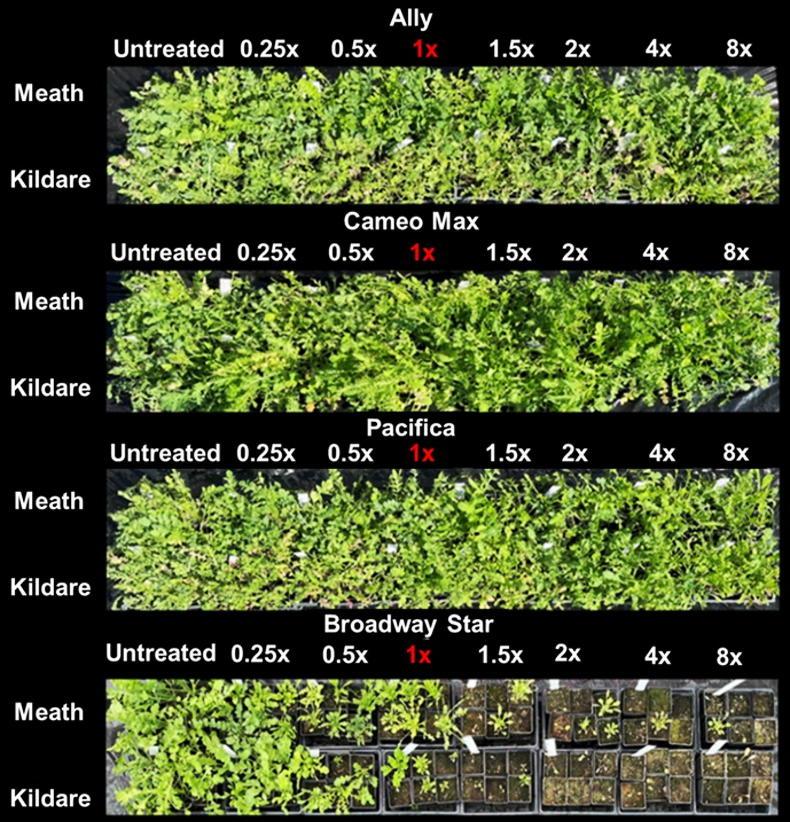
Figure 3: Surviving plants of suspect resistant poppy populations following application of ALS-Ally, Cameo, Pacifica and Broadway herbicides at dose rates from 0.25 to eight times the field label rates (in red).
Broadway Star was practically ineffective, as 1.5 times the legal label rate was needed to achieve some control of poppies with this herbicide which would not be allowed on farm.

Corn marigold in flower.
The suspect resistant population of corn marigold from Co Wexford was grown alongside a sensitive population and treated at four to six leaves with different herbicides at their full label rates (Figure 4).
Figure 4: Symptoms of sensitive and resistant corn marigold populations following application of ALS (Ally Max, Pacifica, Broadway), hormone (2,4-D, Duplosan, Pixarro, Dowshield) and ALS + hormone (Zypar) type herbicides all applied at full label rates. Where surviving plants are absent, full control was achieved.
Ally and Pacifica were able to fully control the sensitive population, but they were ineffective against the resistant population. Subsequent, dose-response experiments (Figure 5) with the resistant population confirmed that Ally was virtually ineffective and Pacifica was effective only at rates above two times the legal rate, which would not be allowed on the farm.

Figure 5: Symptoms of resistant corn marigold following application of ALS (Ally Max, Pacifica, Broadway), herbicides at dose rates from 0.25 to eight times the field label rates (in red). Where plants showed stunting, discoloration or yellowing or death of foliage, full control was achieved.
Broadway and Dowshield were effective on both sensitive and suspect populations.Duplosan and Pixarro are not effective against corn marigold, as per the product label. In addition, 2,4-D and Zypar products do not claim to control corn marigold.This is the first time that suspected herbicide resistance in broadleaved weeds has been genetically confirmed in Ireland.Resistance to ALS herbicides, like Ally, Pacifica Plus and Broadway Star, is widespread in chickweed, poppy, field speedwell and corn marigold.Alternative hormone or auxin mimics and ALS + hormone type products are crucial to manage ALS-resistant populations.In-crop herbicide strategy for spring-sown crops this season:
Many of the autumn-germinating grass weeds (eg bromes, blackgrass) tend to be much less competitive in well-established spring-sown crops. To maximise control, find the best product or product combination for your target grass and broadleaved weed populations and use the recommended rate.
Broadleaf weed control options in spring barley, wheat or oats:
Avoid using ALS herbicides (eg Ally Max, Cameo Max, etc) on their own due to resistance-risk.Use ALS with a hormone partner either as a pre-mix (eg Zypar, Starane, Galaxy) or as a tank mix (eg Ally Max plus Hurler).Use hormone-type products (eg Hurler, Duplosan, etc.
Broadleaved weed control options in spring oilseed rape:Many growers will try to establish the crop quickly and get sufficient cover to avoid the need for herbicide use. For problem fields:
Use residual herbicides (eg Metazachlor or Butisan, Clomazone or Centium).
Broadleaf weed control options in spring beans:
Residual herbicides either as a pre-emergence (eg.pendimethalin and imazamox or Nirvana, pendimethalin and clomazone or Stallion) or as an off-label tank mix (eg Defy and Nirvana or Stomp Aqua and Centium) should be prioritised.Where control is poor, use post-emergent Basagran (limited weed spectrum).Grass weed control
Spring barley, wheat,
oilseed rape and beans
For wild oats and canary grass (off-label):
Use ACCase herbicide Axial in barley and wheat or graminicides Falcon or Stratos Ultra in oilseed rape and beans. However, you need to be careful with tank mixes. Apply with Galaxy or Starane, for example, but not before or for three weeks after application.For bromes
ALS product Broadway Star is also available for use in spring wheat, so spring wheat could be a good option in affected fields.Only use in fields where wild oats resistance to ACCase herbicides (Axial, Falcon, Stratos) is confirmed:
Use ALS-Broadway Star but this is only possible in spring wheat. - Alternatively, ALS products such as Pacifica, Monolith or Broadway can offer effective control but only in winter wheat
.
For blackgrass or Italian ryegrass:
All populations should be treated as resistance-suspect. - Cereal or graminicide herbicide control is only possible if your population is sensitive, which is rare with these weeds.

Vijaya Baskar.
Many farmers will have noticed that some herbicides are not as effective on certain weeds as they used to be. This is becoming a serious issue for crop management.
Chickweed is a common example that many growers will be familiar with as product changes or higher rates have been needed to control the weed.
Other broadleaved weeds have also developed resistance to some herbicides.
Herbicide resistance
As part of the Teagasc weed monitoring programme, broadleaved weeds suspected of herbicide resistance were submitted by growers/advisers in 2022 and 2023 for testing.
Suspected weed populations were subjected to detailed dose-response analysis.
Plants were sprayed at the four- to six-leaf stage, with herbicide rates ranging from 0.25 to eight times the field label rates of ALS herbicides. These included: Ally SX at 30g/ha or Ally Max at 42g/ha or Cameo Max at 60g/ha, Pacifica Plus at 0.5kg/ha or Broadway Star at 265g/ha.
Ally Max, Pacifica and Broadway were virtually ineffective at controlling common chickweed in these trials. This can be seen in Figure 1.

Figure 1: Ineffective weed control in suspect resistant chickweed populations from various locations following application of ALS herbicides Ally Max, Pacifica and Broadway at dose rates from 0.25 to eight times the field label rates (in red).
Ally Max, Pacifica and Broadway were ineffective on population of common field-speedwell suspected of resistance in Co Cork. See Figure 2.

Figure 2: In effective weed control in suspect resistant common field-speedwell following application of ALS-Ally Max, Pacifica and Broadway at dose rates from 0.25 to eight times the field label rates (in red).
Ally, Cameo and Pacifica were ineffective in controlling common poppy. See Figure 3.

Figure 3: Surviving plants of suspect resistant poppy populations following application of ALS-Ally, Cameo, Pacifica and Broadway herbicides at dose rates from 0.25 to eight times the field label rates (in red).
Broadway Star was practically ineffective, as 1.5 times the legal label rate was needed to achieve some control of poppies with this herbicide which would not be allowed on farm.

Corn marigold in flower.
The suspect resistant population of corn marigold from Co Wexford was grown alongside a sensitive population and treated at four to six leaves with different herbicides at their full label rates (Figure 4).
Figure 4: Symptoms of sensitive and resistant corn marigold populations following application of ALS (Ally Max, Pacifica, Broadway), hormone (2,4-D, Duplosan, Pixarro, Dowshield) and ALS + hormone (Zypar) type herbicides all applied at full label rates. Where surviving plants are absent, full control was achieved.
Ally and Pacifica were able to fully control the sensitive population, but they were ineffective against the resistant population. Subsequent, dose-response experiments (Figure 5) with the resistant population confirmed that Ally was virtually ineffective and Pacifica was effective only at rates above two times the legal rate, which would not be allowed on the farm.

Figure 5: Symptoms of resistant corn marigold following application of ALS (Ally Max, Pacifica, Broadway), herbicides at dose rates from 0.25 to eight times the field label rates (in red). Where plants showed stunting, discoloration or yellowing or death of foliage, full control was achieved.
Broadway and Dowshield were effective on both sensitive and suspect populations.Duplosan and Pixarro are not effective against corn marigold, as per the product label. In addition, 2,4-D and Zypar products do not claim to control corn marigold.This is the first time that suspected herbicide resistance in broadleaved weeds has been genetically confirmed in Ireland.Resistance to ALS herbicides, like Ally, Pacifica Plus and Broadway Star, is widespread in chickweed, poppy, field speedwell and corn marigold.Alternative hormone or auxin mimics and ALS + hormone type products are crucial to manage ALS-resistant populations.In-crop herbicide strategy for spring-sown crops this season:
Many of the autumn-germinating grass weeds (eg bromes, blackgrass) tend to be much less competitive in well-established spring-sown crops. To maximise control, find the best product or product combination for your target grass and broadleaved weed populations and use the recommended rate.
Broadleaf weed control options in spring barley, wheat or oats:
Avoid using ALS herbicides (eg Ally Max, Cameo Max, etc) on their own due to resistance-risk.Use ALS with a hormone partner either as a pre-mix (eg Zypar, Starane, Galaxy) or as a tank mix (eg Ally Max plus Hurler).Use hormone-type products (eg Hurler, Duplosan, etc.
Broadleaved weed control options in spring oilseed rape:Many growers will try to establish the crop quickly and get sufficient cover to avoid the need for herbicide use. For problem fields:
Use residual herbicides (eg Metazachlor or Butisan, Clomazone or Centium).
Broadleaf weed control options in spring beans:
Residual herbicides either as a pre-emergence (eg.pendimethalin and imazamox or Nirvana, pendimethalin and clomazone or Stallion) or as an off-label tank mix (eg Defy and Nirvana or Stomp Aqua and Centium) should be prioritised.Where control is poor, use post-emergent Basagran (limited weed spectrum).Grass weed control
Spring barley, wheat,
oilseed rape and beans
For wild oats and canary grass (off-label):
Use ACCase herbicide Axial in barley and wheat or graminicides Falcon or Stratos Ultra in oilseed rape and beans. However, you need to be careful with tank mixes. Apply with Galaxy or Starane, for example, but not before or for three weeks after application.For bromes
ALS product Broadway Star is also available for use in spring wheat, so spring wheat could be a good option in affected fields.Only use in fields where wild oats resistance to ACCase herbicides (Axial, Falcon, Stratos) is confirmed:
Use ALS-Broadway Star but this is only possible in spring wheat. - Alternatively, ALS products such as Pacifica, Monolith or Broadway can offer effective control but only in winter wheat
.
For blackgrass or Italian ryegrass:
All populations should be treated as resistance-suspect. - Cereal or graminicide herbicide control is only possible if your population is sensitive, which is rare with these weeds.

Vijaya Baskar.












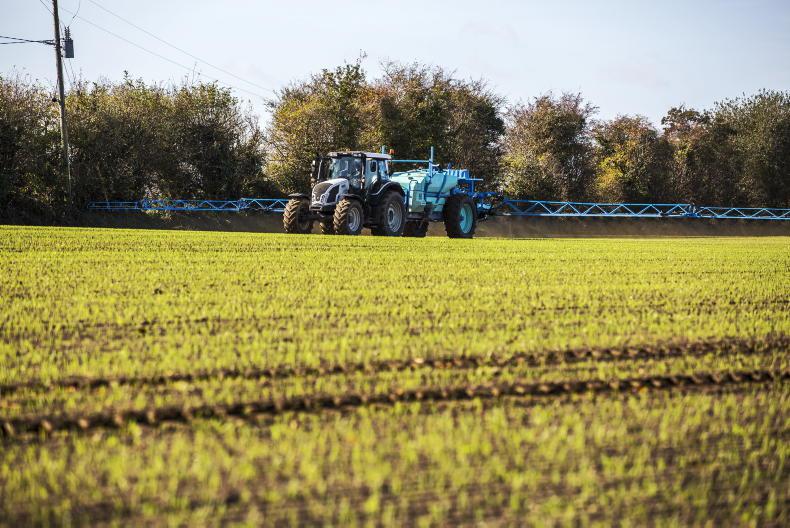

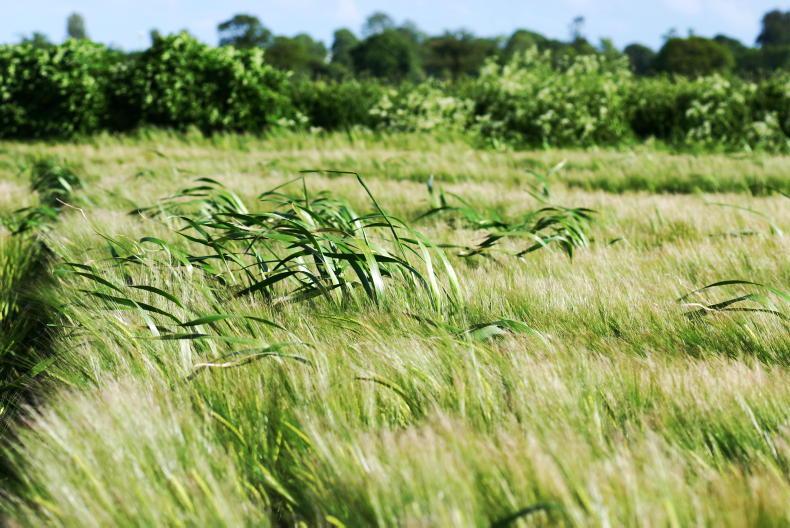
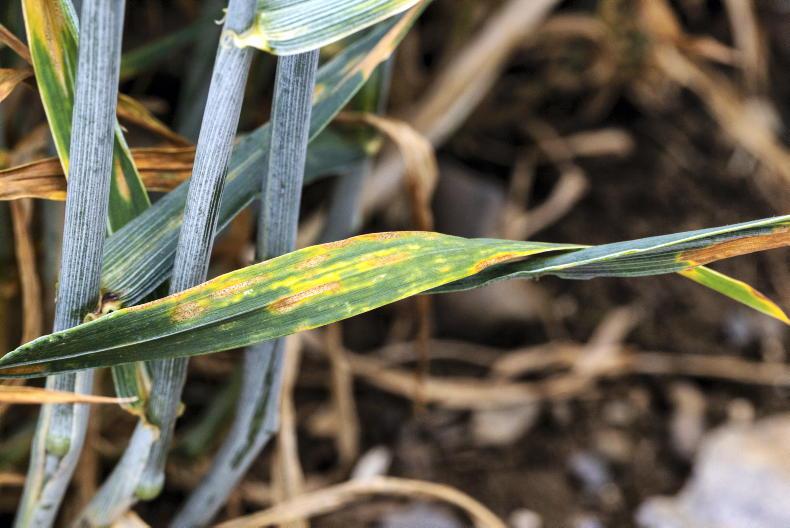
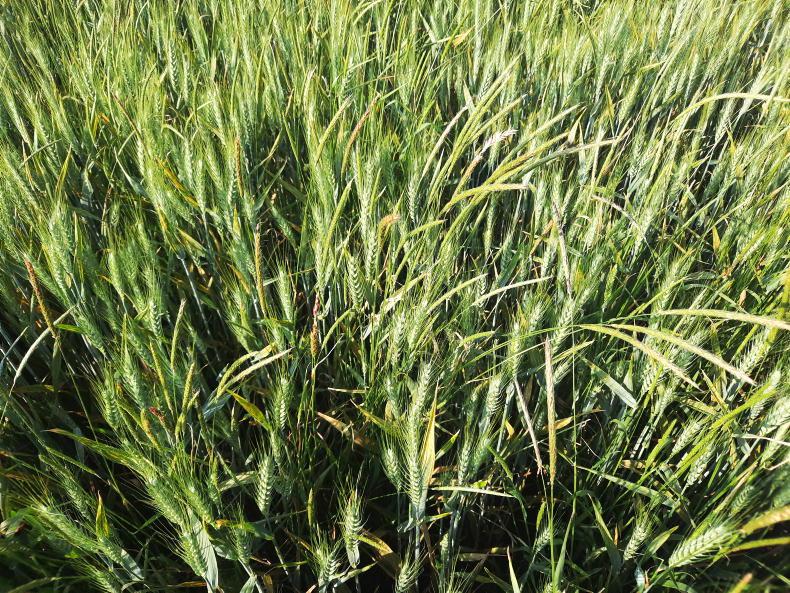
SHARING OPTIONS